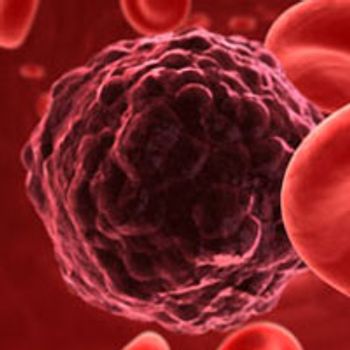
An extended-release injection formulation of granisetron (Sustol) has been approved by the FDA for use in combination with other antiemetic therapies for the prevention of CINV, according to the manufacturer of the treatment, Heron Therapeutics.

An extended-release injection formulation of granisetron (Sustol) has been approved by the FDA for use in combination with other antiemetic therapies for the prevention of CINV, according to the manufacturer of the treatment, Heron Therapeutics.

The FDA granted the PD-L1 inhibitor atezolizumab (Tecentriq) an accelerated approval as a treatment for patients with locally advanced or metastatic urothelial carcinoma.

The FDA granted nivolumab (Opdivo) accelerated approval for the treatment of patients with classical Hodgkin lymphoma (cHL) that has relapsed or progressed after autologous hematopoietic stem cell transplantation (HSCT) and posttransplantation brentuximab vedotin (Adcetris).

The FDA has approved cabozantinib as a treatment for patients with advanced renal cell carcinoma who have received prior antiangiogenic therapy.

The FDA has approved afatinib (Gilotrif) for the treatment of patients with advanced squamous cell non–small cell lung cancer (NSCLC) following progression on platinum-based chemotherapy.

The FDA approved the BCL-2 inhibitor venetoclax (Venclexta) for patients with chronic lymphocytic leukemia who have a 17p deletion (del[17p]), following at least 1 prior therapy.

At the 2016 NCCN Annual Conference, William J. Gradishar, MD, a professor of Breast Oncology at the Feinberg School of Medicine at Northwestern University, discussed updates to the NCCN Breast Cancer Guideline and the latest research developments in the field.


An impressive improvement in progression-free survival (PFS) in the RESONATE-2 trial led to the FDA’s approval of ibrutinib (Imbruvica) March 4 for the frontline treatment of chronic lymphocytic leukemia, based on data from the RESONATE-2 trial.

Patients with follicular lymphoma who relapsed after, or are refractory to, a rituximab-containing regimen, will have a new treatment option, following the FDA’s approval of obinutuzumab (Gazyva).

Patients with pretreated, HR-positive, HER2-negative metastatic breast cancer can now receive palbociclib (Ibrance) for use in combination with fulvestrant following the FDA’s recent approval of this new indication for the CDK 4/6 inhibitor.

Fosaprepitant dimeglumine (Emend for injection) received FDA approval as a single-dose in combination with other antiemetic agents for the prevention of delayed chemotherapy-induced nausea and vomiting following moderately emetogenic chemotherapy.

Results from clinical trials presented at the 2016 Gastrointestinal Cancers Symposium signal a role for the immunotherapy nivolumab (Opdivo) in the treatment of GI malignancies.

Ofatumumab (Arzerra) has been approved by the FDA as extended treatment for patients in complete or partial response following at least two lines of therapy for recurrent or progressive chronic lymphocytic leukemia (CLL).

The FDA has approved the expanded indication for single-agent pembrolizumab (Keytruda) to include the frontline treatment of patients with unresectable metastatic melanoma regardless of BRAF status.

For women with heavily treated HER2-positive breast cancer, T-DM1 (ado-trastuzumab emtansine, Kadcyla) was found to improve overall survival (OS) by 7 months according to updated data from a phase III trial.

The immunotherapy pembrolizumab (Keytruda) demonstrated on overall response rate (ORR) of 12% in patients with ER-positive, HER2-negative advanced breast cancer in the phase 1b KEYNOTE-028 trial, marking the second early-stage trial to show antitumor activity with this agent in breast cancer.

The FDA has approved Empliciti (elotuzumab) in combination with Revlimid (lenalidomide) and dexamethasone for patients with multiple myeloma who have received one to three prior therapies.

The FDA has expanded the approval of Yervoy (ipilimumab) to include adjuvant treatment of fully resected stage III melanoma. The treatment will apply to patients with pathologic involvement of regional lymph nodes >1 mm.

The FDA has approved the first-in-class oncolytic viral therapy Imlygic (T-VEC; talimogene laherparepvec) for the local treatment of unresectable lesions of the skin and lymph nodes in patients with melanoma that recurred after initial surgery.

Trabectedin (Yondelis) chemotherapy was approved by the FDA for treatment of patients with specific metastatic soft tissue sarcomas-liposarcoma and leiomyosarcoma-who previously received chemotherapy that included an anthracycline.

The PD-1 agent nivolumab (Opdivo) was FDA approved October 9 for patients with non-squamous non-small cell lung cancer (NSCLC) whose cancer progressed during or following platinum-based chemotherapy.

The PD-1 inhibitor pembrolizumab (Keytruda) was approved by the FDA today for patients with pretreated advanced non–small cell lung cancer (NSCLC) across all histologies whose tumors express PD-L1.

The oral nucleoside TAS-102 (Lonsurf) received FDA approval today for the treatment of patients with advanced colorectal cancer (CRC) who are not responding to other treatments.

Oncology practitioners now have a new drug in their armamentarium to help prevent chemotherapy-induced nausea and vomiting (CINV) following the FDA's approval today of the oral agent rolapitant (Varubi).

A phase III trial evaluating the efficacy of nivolumab (Opdivo) for the treatment of advanced renal cell carcinoma has been stopped early after the immunotherapy agent demonstrated a survival advantage over the comparator drug, everolimus (Afinitor), in the CheckMate-025 trial.

Certain subgroups of patients with advanced non¬–small cell lung cancer have a new frontline treatment option following the FDA's approval July 13 of gefitinib (Iressa).

In a phase III trial the immunotherapy nivolumab (Opdivo) improved overall survival and was less toxic than docetaxel in both nonsquamous and squamous non–small cell lung cancer.

Adding palbociclib (Ibrance) to standard fulvestrant more than doubled progression-free survival in pretreated patients with HR-positive, HER2-negative breast cancer, according to study results presented at the 2015 ASCO Annual Meeting.

Pembrolizumab (Keytruda) had an overall response rate (ORR) of 45.2% among a cohort of patients with high PD-L1-expressing non–small cell lung cancer (NSCLC) in the phase I KEYNOTE-001 trial.